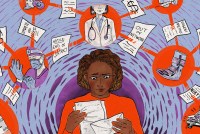Latest KFF Health News Stories
En los últimos 17 años, este fondo ha entregado casi $2.200 millones a estados, territorios, grandes ciudades y entidades para preparar los sistemas de salud ante futuras pandemias, ciberataques o tragedias con múltiples víctimas.
White House Calls This 9/11-Era Fund ‘Wasteful.’ Red and Blue States Rely on It.
States from California to Texas say they rely on tens of millions in federal funding to help them prepare for the next pandemic, cyberattack, or mass-casualty catastrophe. The Trump administration wants to cut it.
Farmers, Barbers, and GOP Lawmakers Grapple With the Fate of ACA Tax Credits
Small-business owners and their employees, who make up nearly half of the Obamacare marketplace, are worried about their health care and their livelihoods as insurance prices surge. Republicans, who have long opposed Obamacare, are at odds over how to respond to upset from one of their party’s most loyal constituencies.
While Politicos Dispense Blame, These Doctors Aim To Take Shame Out of Medicine
Clinicians and researchers are starting to embrace an effort to develop what’s known as “shame competence” in physicians to combat burnout and prevent that uncomfortable emotion from being passed along to patients.
Cuando hay un brote de una enfermedad prevenible con vacunas, funcionarios habitualmente alertan a los residentes, difunden actualizaciones sobre la amenaza creciente, y promueven las dosis.
Louisiana Took Months To Sound Alarm After Two Babies Died in Whooping Cough Outbreak
Louisiana health officials appear to have deviated from the usual steps for public health communications amid a whooping cough outbreak after it killed two infants.
Defensores de los derechos de los inmigrantes advierten que esta decisión sin precedentes podría llevar a que algunas personas pierdan su cobertura médica simplemente por no haber entregado a tiempo la documentación.
From Narcan to Gun Silencers, Opioid Settlement Cash Pays Law Enforcement Tabs
Local governments have received hundreds of millions of dollars from the opioid settlements to support addiction treatment, recovery, and prevention efforts. Their spending decisions in 2024 were sometimes surprising and even controversial. Our new database offers more than 10,500 examples.
Sock Hops and Concerts: How Some Places Spent Opioid Settlement Cash
States, counties, and cities are receiving millions in opioid settlement money to address the addiction crisis. The ways they spent the dollars in 2024 sometimes drew criticism from advocates and at least one state official, who alleged misuse.
Trump’s HHS Orders State Medicaid Programs To Help Find Undocumented Immigrants
Federal health authorities have taken the “unprecedented” step of instructing states to investigate certain individuals on Medicaid to determine whether they are ineligible because of their immigration status, with five states reporting they’ve received more than 170,000 names collectively.
The Nation’s Largest Food Aid Program Is About To See Cuts. Here’s What You Should Know.
The federal government is making sweeping changes to SNAP, the program that helped feed about 42 million people in the U.S. last year. Here’s a breakdown of the changes to come and potential impacts.
At The Hollow in Florida, the ‘Medical Freedom’ Movement Finds Its Base Camp
Florida’s surgeon general, spiritual healers, and Trump allies push their cures in a swampy outpost of anti-government absolutism and mystical belief.
Better Treatments Buoy Multiple-Myeloma Patients, Bound by Research Cuts and Racial Disparities
Although racial disparities in the diagnosis and treatment of multiple myeloma remain, Black survivors of multiple myeloma say the latest developments in treatment give them hope even as federal research cuts create a grim forecast for cancer research.
What the Health? From KFF Health News: Happy Open Enrollment Eve!
A standoff in Congress is keeping much of the government shut down as open enrollment begins in most states for Affordable Care Act plans. Democrats are demanding Republicans agree to extend ACA tax credits, but there has been little negotiating — even as customers are learning what they’ll pay for coverage next year. Meanwhile, the Trump administration is telling states they can’t pass their own laws to keep medical debt off consumers’ credit reports. Paige Winfield Cunningham of The Washington Post, Maya Goldman of Axios, and Alice Miranda Ollstein of Politico join KFF Health News’ Julie Rovner to discuss those stories and more.
California enfrenta barreras al querer frenar redadas del ICE en entornos de salud
El gobernador demócrata Gavin Newsom promulgó el mes pasado la ley SB 81, que prohíbe a los centros médicos permitir el acceso de agentes federales a áreas privadas sin una orden judicial o de registro válidas.
Refugees Will Be Among the First To Lose Food Stamps Under Federal Changes
Under the budget law that Republicans call the One Big Beautiful Bill Act, food assistance for refugees will be sliced. The change is sowing fear, uncertainty, and a struggle for survival — a sign of what’s to come for millions of Americans.
California Faces Limits as It Directs Health Facilities To Push Back on Immigration Raids
California now has a law requiring hospitals and clinics to improve patient privacy and have clear protocols for handling requests by immigration agents. Legal experts say the state can’t fully protect immigrant patients, because federal authorities are allowed in public places, including hospital lobbies, general waiting areas, and parking lots.
The Quiet Collapse of America’s Reproductive Health Safety Net
The HHS office that administers the Title X family planning program has been effectively shut down. And with cuts to federal funding for other family health programs, expected Medicaid cuts, and the potential lapse of ACA subsidies, health leaders fear they are seeing the biggest setback to U.S. reproductive care in half a century.
So Your Insurance Dropped Your Doctor. Now What?
Patients sometimes find themselves scrambling for affordable care when a contract dispute causes a hospital — and most of the doctors and other clinicians who work there — to be dropped from an insurance network. Here are six things to know if that happens to you.
Doctor Tripped Up by $64K Bill for Ankle Surgery and Hospital Stay
A doctor in Colorado became the patient after an accident totaled her car and sent her to the operating room. The hospital kept her overnight, but her insurer stopped paying after she left the emergency room.






















